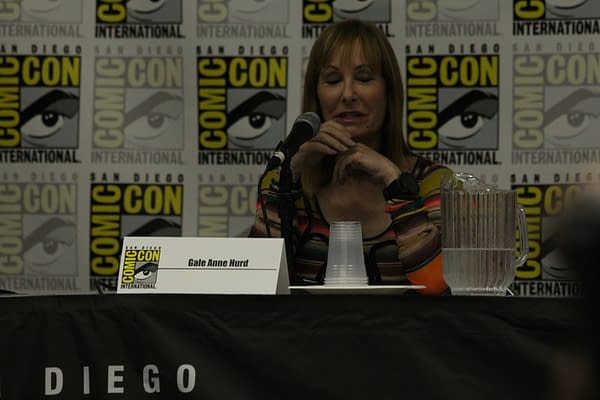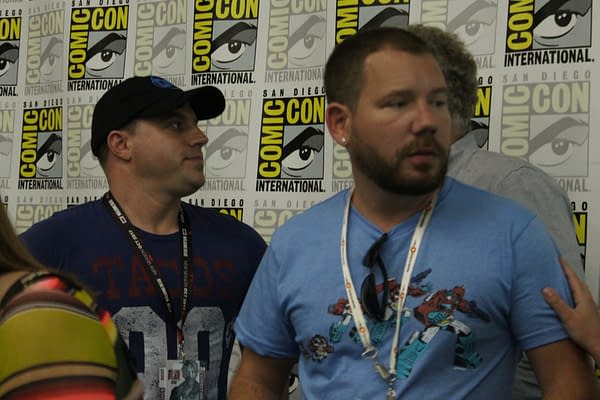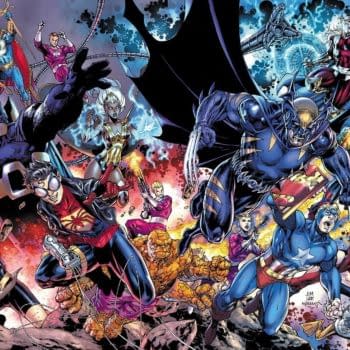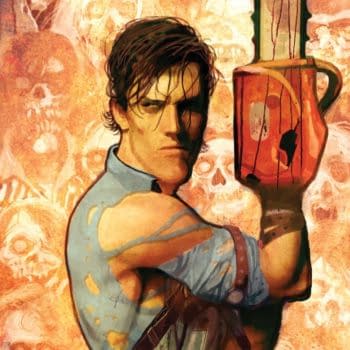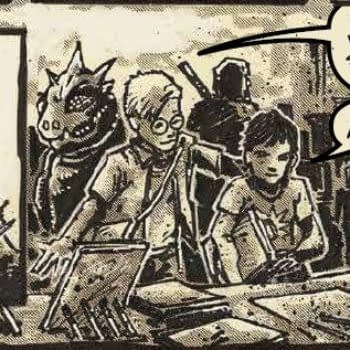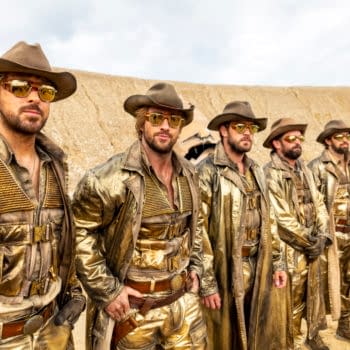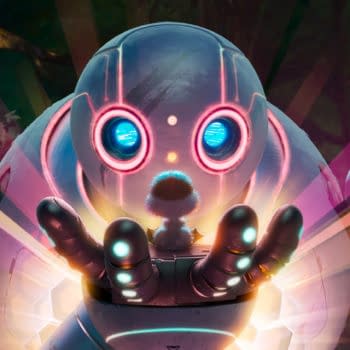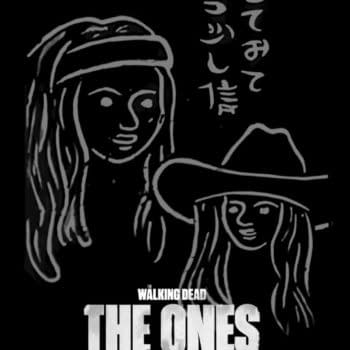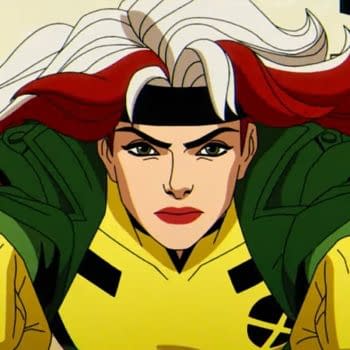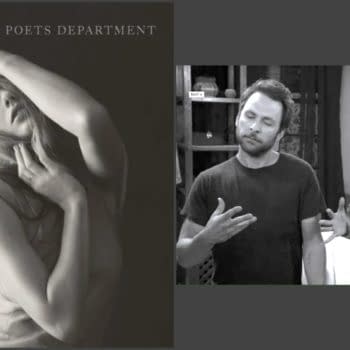Posted in: Movies, san diego comic con, TV | Tagged:
How Will 3D, VR, Streaming And Social Media Change Entertainment? Bigwigs Asked At San Diego Comic-Con
By Hilton Collins
"Five years from now, where do you think your medium will be?"
That was the final question host Terri Schwartz asked four entertainment
Heavyweights late Thursday afternoon in the panel, IGN's Game Changers: Nerds Win. What's Next? During San Diego Comic-Con. She challenged them to envision how their respective industries would take shape in the near future.
Their answers varied in tone and seriousness.
Carlton Cuse, producer of the suspenseful mystery drama Lost and horror drama The Strain, went the serious and insightful route. According to him, online programming is nipping at TV's heels.
"The rise of streaming will swamp everything, and I think that will have a significant impact," he said. "It's being deeply impacted by the rise of companies like Netflix and Amazon, and it will be interesting to see if Apple gets into that as well."
Media consumption—and the public's relationship to it—will change. Video game designer Cliff Bleszinski, who was involved in the Unreal and Gears of War franchises, also went deep.
"I think video games are going to get more connected. You're going to have more people playing them professionally [and] more people getting paid by fans just to watch them play," he said. "You're going to see increased budgets but also weirder stuff."
DC Entertainment president and chief creative officer Geoff Johns cracked a joke. If entertainment itself grows and expands, so will the San Diego Convention Center.
"I think they're going to add another wing to this building," he said.
And the final panelist, prolific producer Gale Anne Hurd of The Walking Dead and Fear the Walking Dead fame, spoke of how modern media empowers consumers to become creators.
"Anyone in this room has the opportunity to be the next great creator, because there's so many mediums available to you that didn't exist when I was started out," she said, undoubtedly referring to platforms like YouTube, Twitch, and activities like blogging.
That was the last exchange of the panel, but it perfectly encapsulated the entire session. The successful leaders were more than qualified to discuss their changing fields, and they analyzed everything from social media to virtual reality and 3D—and more.
Genre entertainment is truly the center of it though, regardless of medium or mechanism. Superhero movies and video games are billion dollar industries, and the most popular TV shows involve dragons and zombies. Sci-fi IP and cinematic universes drive the evolution.
"IP is the big movie star now," Johns said. "There's very few movie stars left that drive box office."
Cuse echoed the sentiment. He's experienced how a popular franchise brand can open doors in entertainment productions. He's spent the last six months developing Amazon's upcoming Jack Ryan series, based on the popular character from Tom Clancy's titular novels. The whole reason he got the money for the series is because of the popularity of the Jack Ryan character.
People love the characters and stories, but they're only somewhat embracing newer ways to experience them. People are interested in 3D and VR, for example, but they're still mainly seen as accessories or gimmicks.
VR in particular has yet to really take off. Companies use it to make great demos, but after people play a cool VR experience for a brief time, they're often pretty much done with.
Bleszinski feels that platform holders don't fund VR enough to make it viable, and Johns agreed.
"Right now with Justice League, we're doing a VR experience, but it starts to go into marketing costs," Johns said. "We have a TV department, we have a games department, a film department. There's no VR department yet. It falls into marketing [and] has yet to change our business."
VR's on the wane for now, but he feels that it will become more prevalent… eventually. 3D's faring much better, but it's in a similar situation. There are 3D movies and TVs, but they haven't overtaken "regular" movies and television, which most people still seem to prefer.
And some consumers simply can't handle them anyway, for various reasons.
3D IMAX, it made me sick," Hurd said. "I can't have VR goggles or glasses on for more than four seconds or I want to throw up."
3D's popularity also depends on how it's applied. Filmmakers like Christopher Nolan and James Cameron have directed movies with 3D specifically in-mind, but many other filmmakers just tack it on after-the-fact. Hurd and Johns feel that the integrity of 3D application affects viewer enthusiasm.
Johns has more faith in comic books' survival as well as the survival of the characters themselves. He sees comics an art form that will survive despite the naysayers, the same way that radio still exists after people said that TV would kill it.
According to Johns, superheroes are timeless, and comics are crucial source material for other media.
"Dick Tracy and the Shadow, they will disappear from pop culture because they'll be stuck in a certain time period, " he said. "Bane from Dark Knight Rises was created in the '90s in a really cool story called 'Knightfall.' If 'Knightfall' hadn't come out, there would be no Bane."
Social media given fans more power over entertainment's media presence than ever before, but it's not always a good thing when a TV show dominates a platform like Twitter.
"Spoilers didn't used to be a prevalent thing in the past, and now it's a permanent thing. People who want to be spoiled will be, and those who won't, won't," he said.
Things like Twitter and YouTube let viewers join the conversation around their favorite shows, and it's free marketing.
"We're promoting a game, we need to reach out to these young kids who stream for eight hours a day. They play the game and yammer about it," Bleszinski said. Thanks to popular gaming personality on YouTube and Twitch, companies don't have to rely on the press to get the word out.
Ultimately, fans are really using social media to find their digital tribe and feel more connected through their passions.
"We're looking for our community," Hurd said. "All of us are here at Comic-Con because this is our community and what you can have now is connectivity to your community. They don't have to live near you. One great thing social has done is to unite all of us."



